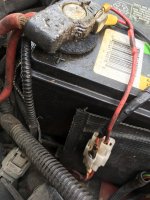bradleyheathhays
Member
So I put a headlight wiring kit from LMC Truck on my '96 Cherokee that circumvents the normal wiring and runs the headlights directly off the battery by way of a relay. The kit runs the lights at 55/100 (low, hi) watts instead of the original 55/60. One reason I did this was because the light output was terrible, and the other was because for some unknown reason the headlights would shut off after being on hi for a bit. Never did this on low. I've had the new wiring kit on for a few years now and it seems to have solved the issue.
The problem I'm having now though is that this new harness is melting at one of the connections...

You can see only one of the wires is overheating while the other seems to be ok. I'm guessing the hot one is used by the high beams.
What could be causing this? Could it be related to why the high beams used to shut off before I replaced the wiring harness? A while back I asked about the shutting off issue on a number of Jeep boards but nobody had heard of this particular problem before.
The problem I'm having now though is that this new harness is melting at one of the connections...

You can see only one of the wires is overheating while the other seems to be ok. I'm guessing the hot one is used by the high beams.
What could be causing this? Could it be related to why the high beams used to shut off before I replaced the wiring harness? A while back I asked about the shutting off issue on a number of Jeep boards but nobody had heard of this particular problem before.
